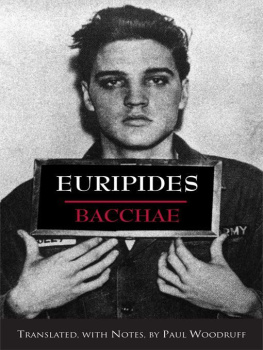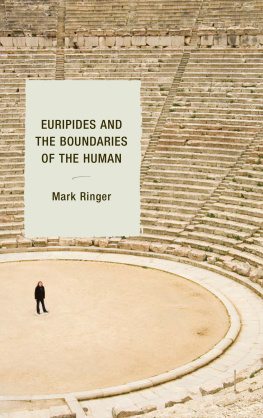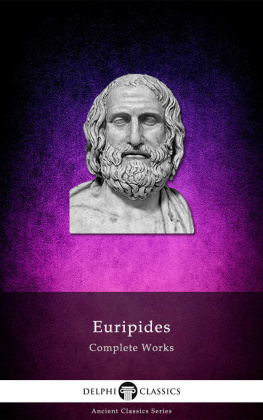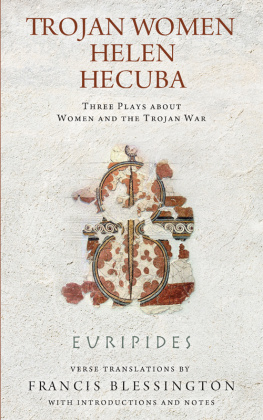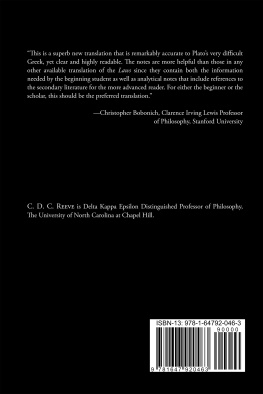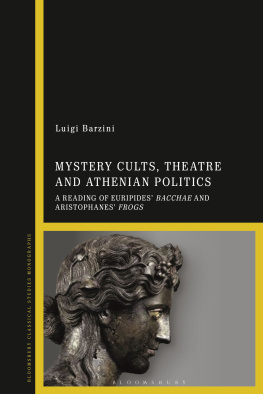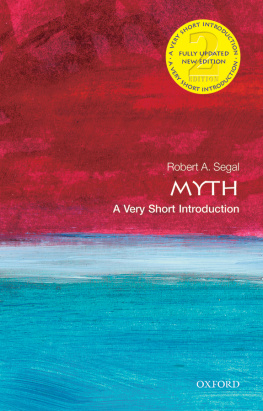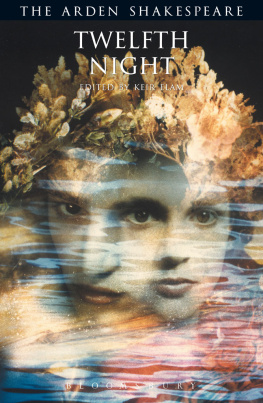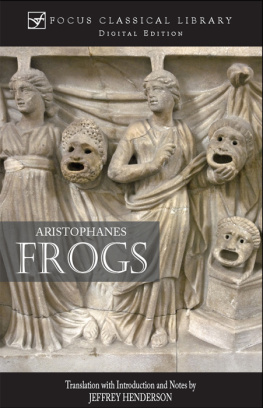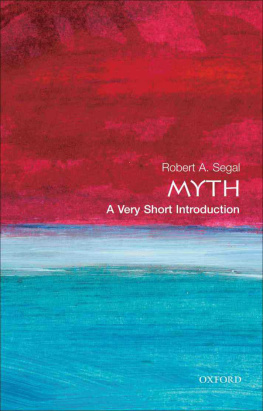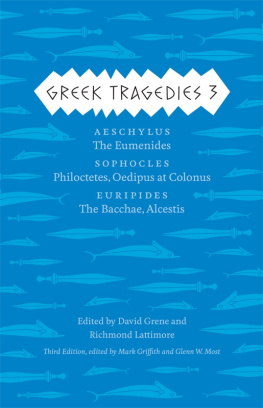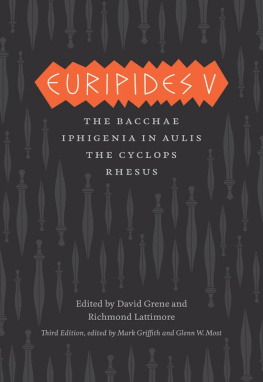Euripides - Bacchae
Here you can read online Euripides - Bacchae full text of the book (entire story) in english for free. Download pdf and epub, get meaning, cover and reviews about this ebook. year: 1998, publisher: Hackett Publishing Company, Inc., genre: Religion. Description of the work, (preface) as well as reviews are available. Best literature library LitArk.com created for fans of good reading and offers a wide selection of genres:
Romance novel
Science fiction
Adventure
Detective
Science
History
Home and family
Prose
Art
Politics
Computer
Non-fiction
Religion
Business
Children
Humor
Choose a favorite category and find really read worthwhile books. Enjoy immersion in the world of imagination, feel the emotions of the characters or learn something new for yourself, make an fascinating discovery.
- Book:Bacchae
- Author:
- Publisher:Hackett Publishing Company, Inc.
- Genre:
- Year:1998
- Rating:3 / 5
- Favourites:Add to favourites
- Your mark:
- 60
- 1
- 2
- 3
- 4
- 5
Bacchae: summary, description and annotation
We offer to read an annotation, description, summary or preface (depends on what the author of the book "Bacchae" wrote himself). If you haven't found the necessary information about the book — write in the comments, we will try to find it.
Bacchae — read online for free the complete book (whole text) full work
Below is the text of the book, divided by pages. System saving the place of the last page read, allows you to conveniently read the book "Bacchae" online for free, without having to search again every time where you left off. Put a bookmark, and you can go to the page where you finished reading at any time.
Font size:
Interval:
Bookmark:
Bacchae
Euripides
Bacchae
Translated,
with an Introduction and Notes, by
Paul Woodruff
Hackett Publishing Company, Inc.
Indianapolis/Cambridge
Copyright 1999 by Hackett Publishing Company, Inc.
All rights reserved
Printed in the United States of America
13 12 11 10 09 4 5 6 7 8
For further information, please address
Hackett Publishing Company, Inc.
PO Box 44937
Indianapolis, IN 46244-0937
www.hackettpublishing.com
Cover design by Brian Rak and John Pershing
Text design by Meera Dash
Library of Congress Cataloging-in-Publication Data
Euripides.
[Bacchae. English]
Bacchae / Euripides : translated, with introduction and notes, by Paul Woodruff.
p. cm.
Includes bibliographical references (p. ).
ISBN 0-87220-392-1 (paper). ISBN 0-87220-393-X (cloth)
1. Dionysus (Greek deity)Drama. 2. Pentheus (Greek mythologyDrama. 3. BacchantesDrama. I. Woodruff, Paul, 1943 . II. Title.
PA3975.B2W66 1999
882.01dc21 98-37826
CIP
PRC ISBN: 978-1-60384-534-2
Contents
The page numbers in curly braces {} correspond to the print edition of this title.
{vii}
This translation is intended primarily for classroom use. I have aimed first of all at being clear and true to the basic meaning of the text. After that, I have tried to bring across some of the beauty of poetry given the chorus as well as the rhetorical power and cleverness of the dialogue and speeches. And I have tried to give the characters the different voices I hear in the Greek, so that the translation can be produced on stage with minimal changes.
The transmission of this play through manuscripts is unusually troublesome; many lines seem to have fallen out during copying and storage over the centuries and many errors have been introduced. Although I have supplied a few lines to fill small gaps where the meaning is obvious, I have not devised speeches to make up for the lost passages at the end; instead, I have included an appendix with the main evidence we have that pertains to them. In a stage production, I would have the messenger declare that the speeches are lost and summarize their content.
In the cult songs and other lyric passages given to the chorus, I have tried to preserve their concision, their striking use of compound formations, and their ambiguities. I have avoided the repetitions with which some translators have tried to render poetic and religious elements.
The translation is almost exactly line-for-line, with marginal numbers referring to the Oxford text. My version is not word-for-word, however, or syntax-for-syntax. I have often chosen to be faithful to the rhetorical emphasis of Euripides word order at the expense of other sorts of accuracy.
{viii} Footnotes give information that will be helpful to readers with no classical background. Endnotes keyed to line numbers deal with major questions of interpretation or scholarship. Following the lead of previous editors, I have supplied a small number of stage directions.
The text I have translated rarely departs from Diggles. I have everywhere used the classic commentary by Dodds and the new one by Seaford, with its novel and interesting interpretation.
I am grateful for advice to the publishers anonymous reader and to my colleagues Barbara Goff and Paula Perlman. Thomas Palaima gave me valuable help with the introduction. Special thanks are due also to Philip Bobbitt, whose poetry group encouraged me to carry on translating verse into verse.
{ix}
The Play
Some time after Euripides death, 4076 B.C.E., his son produced three plays that were evidently his last work. One of these was Bacchae, a play unlike all others of his that have come down to us. No other literary work of the period goes so far in conveying the depth of feeling that belonged to the religious spirit of ancient Greece; none depicts a god behaving more savagely toward human beings. It is a play of many paradoxes, and it concerns a god whose eternal smile, fixed on the mask worn by the actor, can seem by turns to be warm, derisive, and menacing. It is a play about a kind of power that human beings must simply accept, that can lead them unwilling to sacrifice and initiationor to terror and destruction. The play works by building, and at the same time resolving, conflicts between brute force and religion, between new and old, between savage and civilized, between city and mountain. Its choral poems veer from piercing beauty to clich, its scenes move from comic to tragic, and its mood turns upside down, starting with hymns of devotion to a god of peace, but ending with a mothers lament over the body of a boy she has torn apart with her bare hands.
The place is Thebes, birthplace of the god Dionysus, a city of broad fields not far from imposing mountains, and the main action takes place where field and mountain meet, in the rough uplands and mountain pastures on the shoulders of Mt. Kithairn. This action we never see, however, except through the eyes of the {x} messengers who report to us the astounding things they have seen with their own eyes. The stage is set in the city, in front of the great house of the royal family, where a chorus of outlandishly dressed foreign women wheel and dance, singing cult songs of Dionysus. These Bacchae, as the women who celebrate Dionysus are called, are ushered on stage by the god himself.
Dionysus has many names in the play, and shows himself in many ways. He is Bacchus, Iacchus, and Eviusall names that evoke the joy of worshiping this god of peace and wine and dancing. He is also Bromius, the Thunderer, born in a blast of lightning, bringing terror against his enemies. He has come home to Thebes, where he was born of a human mother, and where his mothers sisters have long denied his divinity. He plans a horrible punishment for the royal family, a punishment that begins in the classic waywith the madness of the victims. Dionysus is most angry at his mothers sisters, his aunts, and these he drives into the mountains, where they dance themselves into frenzies, open springs of milk or wine in bare rock, and catch wild beasts, which they tear apart and eat rawthe legendary behavior of troops of women known as Maenads.
Meanwhile, back at the palace, there is a young kingvery young for a king, no older than a college freshmanthe son of one of Dionysus own aunts, Agav. The boys name is Pentheus, and he thinks that because he is king he can put a stop to this new religion. Perhaps he, too, has been crazed by Dionysus, albeit in a very different way from his mother and aunts; or perhaps he has decided against Dionysus on rational grounds (as the chorus will imply). But, like many males of his time and place, he appears to be concerned mostly about maintaining order among women, for fear that they will give way to orgies of sex. Whatever the reason, Pentheus enacts a legendary resistance to Dionysus. Although the Greeks had worshiped Dionysus from the earliest times of which we have record (he is mentioned in Linear B texts), they celebrated him as a foreign god whose epiphanies annually startle and shake the traditional social order.
Pentheus first plans to take an army against the Maenads on the mountain, but Dionysus forestalls this action. The god takes the form of a beautiful young man from abroad with long blond curls and effeminate ways, who nevertheless has a powerful way with words. He talks Pentheus into going up the mountain in disguise, without an army, for purposes of observation before attempting {xi} military action. Perhaps this is sound tactics; perhaps it is an act of madness induced by the god; perhaps it simply expresses a set of desires latent in the young kings heart to see women at sexual play and even to be one of them. Perhaps it is all three. In any case, he allows Dionysus to dress him as a womana very revealing disguise, for it brings out the part of Pentheus mind he is trying hardest to suppressand lets the god lead him up the mountain to spy on the women. There they spy him, mistaking him for a wild beast, and tear him limb from limb, playing catch with pieces of him. His mother Agav, in the lead, carries off his mangled head, and she brings it proudly into town under the delusion that it is the head of a lion she has slain with her own hands. She who failed to appreciate the divinity of her sisters son is now able to recognize the beastliness of her own boybut not to see him as hers. Her punishment comes when she sees clearly, for the first time, what it is that she has been carrying, and realizes that she has killed her own son, brutally. Then she knows Dionysus for the potent god he is.
Next pageFont size:
Interval:
Bookmark:
Similar books «Bacchae»
Look at similar books to Bacchae. We have selected literature similar in name and meaning in the hope of providing readers with more options to find new, interesting, not yet read works.
Discussion, reviews of the book Bacchae and just readers' own opinions. Leave your comments, write what you think about the work, its meaning or the main characters. Specify what exactly you liked and what you didn't like, and why you think so.

